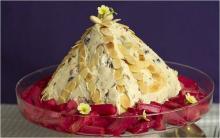Easter Customs
Throughout the English-speaking world, many Easter traditions are similar with only minor differences. For example, Saturday is traditionally spent decorating Easter eggs and hunting for them with children on Sunday morning, by which time they have been mysteriously hidden all over the house and garden. Other traditions involve parents telling their children that eggs and other treats such as chocolate eggs or rabbits, and marshmallow chicks, have been delivered by the Easter Bunny in an Easter basket, which children find waiting for them when they wake up.
Many families observe the religious aspects of Easter by attending Sunday services in the morning and then participating in a feast or party in the afternoon. Some families have a traditional Sunday roast, often of either roast lamb or ham. Easter breads such as Simnel cake, a fruit cake with eleven marzipan balls representing the eleven faithful apostles, or nut breads such as potica are traditionally served. Hot cross buns, spiced buns with a cross on top, are traditionally associated with Good Friday, but today are often eaten well before and after (and, indeed, are sold in many supermarkets and bakers all year round). In Scotland, the north of England, and Northern Ireland, the traditions of rolling decorated eggs down steep hills and pace egging are still adhered to.
